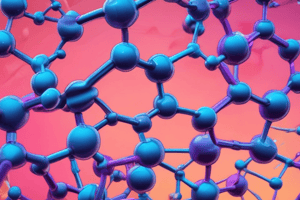Podcast
Questions and Answers
What is the primary reason that makes organic chemistry diverse?
What is the primary reason that makes organic chemistry diverse?
- Oxygen's presence in organic compounds
- The simplicity of carbon-based molecules
- Carbon's ability to form multiple bonds (correct)
- Carbon's abundance in nature
How many valence electrons does a carbon atom have?
How many valence electrons does a carbon atom have?
- 8
- 6
- 4 (correct)
- 2
What type of bond is formed when six carbons share one sigma bond and five p orbitals overlap above and below the plane?
What type of bond is formed when six carbons share one sigma bond and five p orbitals overlap above and below the plane?
- Aromatic ring (correct)
- Double bond
- Single bond
- Triple bond
Which type of bond has the highest bond energy in organic compounds?
Which type of bond has the highest bond energy in organic compounds?
What allows carbon to make large, complex structures in organic chemistry?
What allows carbon to make large, complex structures in organic chemistry?
Which element is NOT commonly found in organic compounds besides carbon and hydrogen?
Which element is NOT commonly found in organic compounds besides carbon and hydrogen?
In organic chemistry, what type of bonds vary in strength depending on how many pairs of electrons are shared between them?
In organic chemistry, what type of bonds vary in strength depending on how many pairs of electrons are shared between them?
What type of structure results from branching in carbon chains?
What type of structure results from branching in carbon chains?
Which type of carbon-carbon bond is the strongest in organic compounds?
Which type of carbon-carbon bond is the strongest in organic compounds?
What allows carbon to achieve stability in organic compounds?
What allows carbon to achieve stability in organic compounds?
Flashcards are hidden until you start studying
Study Notes
Chemistry: Organic Compounds and Carbon
Organic componds primarily consist of carbon and hydrogen atoms, though they can also contain other elements such as oxygen, nitrogen, phosphorus and sulfur. In these molecules, carbon usually forms multiple bonds with its neighboring atoms, allowing it to bond easily with itself and with other elements. This characteristic of forming covalent bonds is what makes organic chemistry so diverse.
Carbon has four valence electrons, which means it needs to form four bonds to achieve stability. It can do this through single bonds, double bonds, triple bonds, or even aromatic rings where six carbons share one sigma bond and five p orbitals overlap above and below the plane. These different types of bonds allow carbon to make large, complex structures by sharing electrons among its neighbors.
Bond strength varies between different types of bonds. Single carbon-carbon bonds are the weakest, followed by double and triple carbon-carbon bonds, while carbon-hydrogen bonds have the highest bond energy. However, due to the nature of chemical bonding, all C-C bonds have roughly similar strengths regardless of how many pairs of electrons there are shared between them.
Carbon compounds range from simple to very complex. Straight chains containing several hundred carbons can be made if needed; branching occurs when a chain has more than two carbons. Some common organics are alkanes, halogenated solvents, alcohols, ethers, esters, and amines, all based on straight chains or cycloalkyl groups. Synthetic polymers like polyethylene, nylon, polystyrene, and polyvinyl chloride are derived from petroleum by breaking their molecular chains into smaller units. As such, organic chemistry encompasses a wide variety of materials, some natural and others man-made.
In summary, understanding the role of carbon in organic chemistry is crucial because of its property of forming strong covalent bonds with itself and other elements, which allows for the formation of numerous organic compounds with varying levels of complexity.
Studying That Suits You
Use AI to generate personalized quizzes and flashcards to suit your learning preferences.




